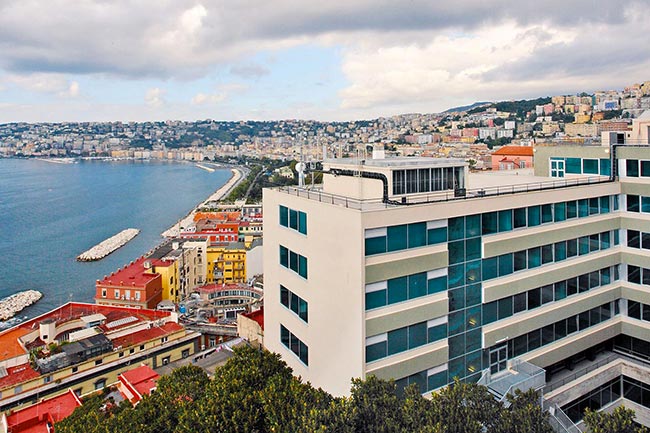The programme trains managers specialised in the management of maritime and port authorities and businesses. These professionals are increasingly in demand due to the development of strategies and actions to enhance the value of the sea (Blue Growth – European Commission) with a view to environmental sustainability. Teaching activities are carried out partly in person and partly online to encourage the active participation of working and off-campus students, as well as to facilitate the organisation of opportunities for discussion with industry experts.
Graduates with a master’s degree in Maritime Economics and Management hold managerial or economic-management consulting positions in both the public and private sectors, in companies operating in the Blue Economy.
In particular, graduates can find employment in the following areas:
– private sector, with shipping companies, port terminal operators, shipping agencies, freight forwarders, brokers, railway companies, logistics and road transport companies, maritime stations, cruise companies, marinas, as account managers, operations managers, product managers, retail managers, marketing & communication managers;
– public, at port authorities, municipalities with intensive state property activities, infrastructure departments of maritime regions such as Campania, ministries, universities and research centres, as port infrastructure management technicians, experts in maritime state property, experts in navigation law and environmental protection, research and statistics office technicians, experts in institutional communication, PhDs.
The Master’s Degree Programme in Economics & Maritime Management was created with the aim of training professionals to work in managerial and operational roles in businesses and organisations operating in the various sectors of the Blue Economy.
The key sectors related to the Maritime Economy are sea-land transport services, shipping, coastal and cruise tourism, recreational boating, shipbuilding, fishing and aquaculture, regulation and environmental protection (UNIONCAMERE, Tenth Report on the Maritime Economy, 2022). In addition to traditional activities related to international trade in commodities, such as liquid and dry bulk, LNG, and high-value goods (containers, reefers, cars, and break-bulk), in recent years the sector has seen strong growth in passenger transport and tourism and recreational activities. The course covers in detail the most relevant issues in the above-mentioned business areas. The full sustainability of the course is guaranteed by the availability of lecturers and researchers from the Department of Business and Quantitative Studies, which has been awarded the status of Department of Excellence by the Ministry of University and Research for the quality of its research.
The course is designed for Bachelor’s graduates with an adequate basic background in business, economics, quantitative analysis, law and languages, who wish to pursue managerial, organisational, administrative and economic-management and accounting consulting positions in both the public and private sectors in activities related to the Blue Economy. The course aims to train graduates with a strategic vision, and who have the ability to analyse and make timely decisions in relation to changes in the Blue Economy sectors and in critical situations. The educational objective is achieved through an interdisciplinary approach. The study plan includes 12 courses in the fields of economics and business, general economics, mathematics and statistics, and law. Students have the opportunity to take an exam of their choice; each year, the Course Comittee recommends courses based on the consistency of their content with the educational objectives of the degree programme.
Teaching is mainly delivered in person; a portion of each course is delivered online. This design aims to encourage attendance by students with specific needs, such as those living away from home and working students, and to facilitate the organisation of opportunities for discussion with industry experts. Teachers provide the e-learning platform with teaching materials to support study and resources for analysis and discussion, in an interactive and collaborative teaching approach. The course is supplemented by language skills teaching, which enables graduates to choose the most appropriate linguistic register for the professional context, and is completed with an internship and a final exam. The maritime vocation of the Campania Region, together with the University’s tradition linked to the maritime economy, which also takes the form of an intense and constant connection with companies in the Blue Economy operating in the Campania region, allows us to offer graduates numerous internship and work experience opportunities.
Course Duration: 2 years
Number of Exams: 12
Credits: 120
Access: Free
Double Degree: No
Class Membership: LM-77
Department: Business and Quantitative Studies
Learning Outcomes
The highly interdisciplinary structure of the degree programme provides advanced economic and management tools in the field of economic analysis and strategic planning, with reference to the business dynamics that characterise the main sectors of the maritime economy. Students acquire knowledge of the organisational and management aspects of shipping companies, port terminals and port authorities, and understand their evolution in terms of competitive and corporate strategies in relation to international developments in the sector.
The courses included in the Study Programme belong to four subject areas: business, economics, law and quantitative analysis. The knowledge acquired by students in the various areas contributes in a cross-disciplinary manner to training managers with managerial, organisational, operational and strategic skills. The knowledge and understanding of the various areas are as follows:
– Business: elements of public management for understanding the specific management characteristics of Port Authorities; the commercial functions of shipping companies, transport services and terminal and port companies; marketing management strategies in transport companies and territorial marketing in public administrations; planning, forecasting and project management in transport infrastructure; investment and financing management in maritime and port companies; personnel management in port companies.
– Economic area: development of international trade and its main drivers; processes of delocalisation and fragmentation of production chains; mono-modal and intermodal transport cycles; economic and technical characteristics of different transport infrastructures and terminals; economic thresholds in the choice between modes of transport; dynamics related to coastal and cruise tourism.
– Legal area: international, EU and national regulations governing the maritime economy; contractual forms regulating the shipping sector in both its public and private aspects, with particular regard to maritime law and its fundamental institutions; regulations governing port infrastructure planning; regulations governing port and maritime work, ship registration and the phenomenon of flag of convenience; international regulations in the field of the environment and maritime safety, state aid rules and antitrust regulations at EU level.
– Quantitative area: analysis of managerial, strategic and operational decision-making processes; mathematical and statistical tools and models for solving complex problems in freight and passenger transport; software tools for modelling and simulating complex systems applied to maritime and port management.
The ability to apply the knowledge acquired to interpret the complexity of economic sectors and the competitive dynamics of companies and organisations operating in the maritime economy sectors is the result of the educational organisation of the training programme. It includes classroom lectures accompanied by examples, exercises, case studies, company testimonials and group work on specific project work, through which students learn to operate critically, developing problem solving skills. Application of the at a theoretical level is also stimulated by the use of applications for electronic data processing.
Further information
All information on the course, from admission to the final exam, for all students interested in enrolling in the Master’s Degree Program in Economics & Management of the Sea.
Admission requirements
Admission to the Master’s Degree Course in Economics & Management of the Sea requires a degree in one of the classes L-18 and L-17 (Economics and Business Management Sciences) or in one of the corresponding classes pursuant to Ministerial Decree 509/99 or other equivalent qualification obtained in Italy or abroad. Graduates with a three-year degree in a different class, a university diploma, a single-cycle Master’s degree or other equivalent qualification obtained in Italy or abroad may also be admitted to the programme. In this case, an adequate level of basic knowledge in the fields of business, economics, statistics, mathematics and law is required. The required knowledge is defined in terms of minimum requirements of 60 ECTS credits in the areas relating to the characteristic scientific disciplines, distributed as follows:
Any additional credits required to complete the curriculum may be obtained by taking individual exams in the areas where the student is deficient.
The adequacy of the individual’s preparation is assessed by a committee appointed by the President of the Interdepartmental School of Economics and Law, upon the recommendation of the Course Coordinator and the Director of the Department of Business and Quantitative Studies.
Internships and Placement
Assistance with external training periods is one of the broader institutional tasks of the University Placement Office, whose mission is to build a bridge between the University and the world of work and offer students and graduates better opportunities for professional integration.
To this end, the Placement Office provides a wide range of services aimed at both students and graduates, as well as companies and public or private bodies that make up its network, carrying out administrative, organisational and promotional activities. The Office keeps its website constantly updated with information on curricular and extracurricular internships, as well as those carried out in collaboration with the CRUI Foundation, and provides a list of companies and public or private bodies that have entered into ad hoc agreements with Parthenope University for the provision of internships in a dedicated section of the website. it also acts as an information desk during opening hours. Direct meetings (Recruiting and Career Day, thematic seminars, workshops) are also organised between students and companies/organisations in order to provide opportunities for extra-university training periods, which are often a prelude to the establishment of subsequent working relationships.
These activities are consolidated through the synergy between the University Placement Office and the Master’s Degree Programme Coordinator for Internship and Placement Activities, who constantly supports the Office in finding both curricular and extracurricular internship opportunities for students and graduates by entering into agreements with companies operating in the Blue Economy sectors. The constant dialogue between the Coordinator and the members of the Degree Programme Steering Committee, the participation of DiSAQ in the development of an innovation ecosystem in collaboration with MAR.TE. Sea-land Logistics, as well as the activities developed in collaboration with the National Technology Cluster “Blue Italian Growth” – CTN BIG and the OdR companies associated with it (approximately 80 entities), have made it possible to offer and develop internship and work experience opportunities for almost 70% of the students enrolled in the degree programme.
Final Exam
The final examination consists of the presentation and discussion of a thesis in a public session with an interdisciplinary committee of lecturers. The thesis is prepared by the student under the supervision of a supervisor. The examination, which carries 15 credits, is designed to assess the student’s ability to process and communicate information. The written work, which must be theoretical and experimental in nature, must be original and may consist of:
If the thesis is written during the internship, the supervisor may be assisted by a company tutor.

MASTER’S DEGREE COURSE COORDINATOR:
Prof. CORSARO Stefania
stefania.corsaro@uniparthenope.it

Palazzo Pacanowski – Via Generale Parisi, 13 – 80132 Napoli
Università degli Studi di Napoli “Parthenope”
Via Amm. F. Acton, 38 – 80133 Napoli (NA)
P.IVA 01877320638 | C.F. 80018240632
2021 – Università degli Studi di Napoli Parthenope – All Right Reserved